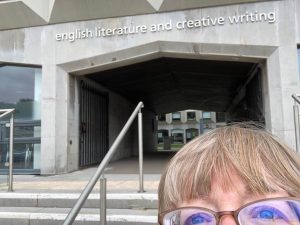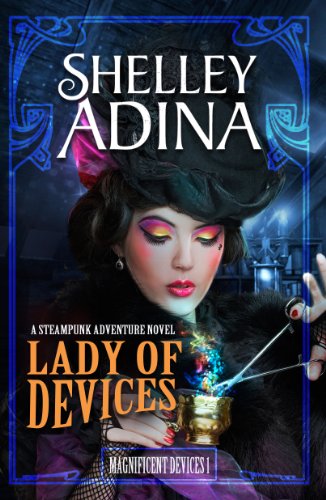Blogging the PhD: First-year review experience
 After submitting nearly 100 pages of material for my review, I felt that I’d done my best and it was now up to my review panel of two (my supervisor and the director of the creative writing program) to tell me what they thought.
After submitting nearly 100 pages of material for my review, I felt that I’d done my best and it was now up to my review panel of two (my supervisor and the director of the creative writing program) to tell me what they thought.
I pretty much knew what Dr. Schad thought, since we meet twice a month over Skype and I get lots of feedback. But I didn’t know what Dr. Ashworth thought. We met at 11:30 on September 14 and spent an hour that seemed more like an amazing brainstorming session than an appraisal!
Dr. Ashworth used phrases like “well plotted” and “it’s clear you’re very experienced” and “I could confirm your PhD candidature today.” So huge sigh of relief there. Then came the questions, which are intended to model those in the confirmation panel in the spring. Those did not produce a sigh of relief. Those produced thought. And excitement. And the sheer joy of the project’s being recognized at the instinctive level of a reader who wants more from the text she’s reading.
And, okay, they produced a little bit of terror.
“You entered this program having expressed the desire to go deeper and learn something different. Do you feel you’re doing that or are you writing more out of habit?”
Um. Habit? Because it’s what I know?
“Who are you writing for? Your current popular fiction readers? Or readers of literary fiction? Or your examiners?”
My current rea– [looks from one to the other at the conference room table]. My examiners.
“Why did you choose the points of view you’ve chosen? If you were to change Lucille to first person, she’s probably putting up a front to the reader. How do we know she’s not lying to herself? How do you show that she is, and then reveal the truth?”
Isn’t first person the character’s internal truth? Aren’t they telling the story as they see it? How can a character in first person tell anything but their own truth? Um. All right, must revisit. Note to self: How deluded is Lucille? Or is she not, and she’s perfectly aware she has to put up a front to survive as a middle-aged woman in the 1920s?
“In PhD-level work there is a certain expectation of experimentation and daring in the text. Where is that here?”
[To self: Define experimentation. Does that mean weird jumps in the story, time going backward and forward with no explanation, quotes stuck in at random that kick you out of the story?] Aloud: Define experimentation?
“This is a citational novel and I see you’ve included many citations from your primary sources as end notes. I don’t read end notes. What is your intent here?”
I love end notes. I always read them in other people’s novels. It grounds a story in reality. But if you want experimental, I could go crazy and put them right in the text. [To self: How weird is that going to look? How do I do that? Hey, I could add in random snippets of Lucille’s poetry that creates its own narrative, contradicting what she’s telling herself. Or vice versa. Hmmm … brain catches fire …]
“Where is the liminal in this manuscript if Holy City is supposed to be a place where people are seeking God? How are you going to show both levels of discovery and revelation?”
Oooooh. I wanted to do that, but was encouraged to take it out. I want to be more internal, but I know that’s not how the manuscript looks at the moment. This is why it’s shallow! Argh! Supervisor and Director disagree on approach! Note to self: Figure out how to do this and rewrite. Again.
So that was the first 15,000 words. Next stop: 35,000 words by April. With depth, and scintillating experimentation! And liminal multi-layering!
Cue the terror. o_O





My goodness! ……and after reading such an essay I do not even know how to respond……congratulations on a great effort and I wish you great success as you continue!
Thanks, Barb! I’m learning a lot, that’s for sure.